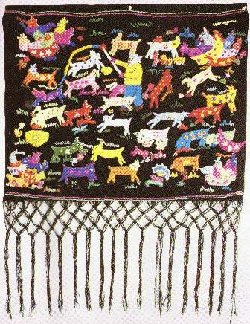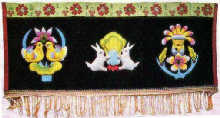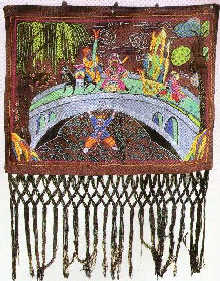Xinji City, located in North China'sHebei Province-- about 300 km south ofBeijing-- is well known for its many folk handcrafts, including paintings, embroidery, glued-cloth pictures, toys andtigershoes. Wall hangings are new products combining the techniques of painting with embroidery and glued-cloth pictures.The materials required for wall hangings are simple: cheap cotton, wool, cloth and thread. The works, which are full of imagination and creativity, convey the folk artists' understanding of life and represent their love for nature and life. Themes mainly include rural life, traditional opera, folk festivals, folk tales and mascots.

The shepherd, for example, represents rural life and the local people's love of nature. In the background of the picture is green grass and flowers, with a shepherd and dozens of sheep standing harmoniously in the foreground. As one of the six common animals in China believed to be lucky, the sheep is beautifully represented in wall hangings.

Auspiciousness displays people's pursuit for a happy life. Mandarin ducks and the lotus flower also symbolize a sweet and harmonious family life. While the rabbit connotes abundance, the magpie and plums represent good luck.

The wall hanging "Zhaozhou Bridge" tells a folk story about Zhao County, Hebei Province. The 1,400-year-old bridge, which is shaped like a rainbow, possesses an important position in world history. Many folk stories in China circulate about this bridge -- and the picture depicted in the wall hanging is one of them. It is said that the great carpenter Lu Ban built Zhaozhou Bridge with his superior skills. The great wonder even lured the gods from the heavens to test it. Zhang Guolao, one of the Eight Immortals, rode a donkey back and forth over the bridge, carrying the sun and moon in a bag; the firewood god rolled his cart, loaded with five mountains, across the bridge; and two celestial beings tried to weigh down the mighty structure. However, even under all this weight, the bridge remained intact thanks to Lu's unparalleled skills.The Xinji people are no longer satisfied with such themes, however, and some new wall hangings depict their longing for a brighter future.










